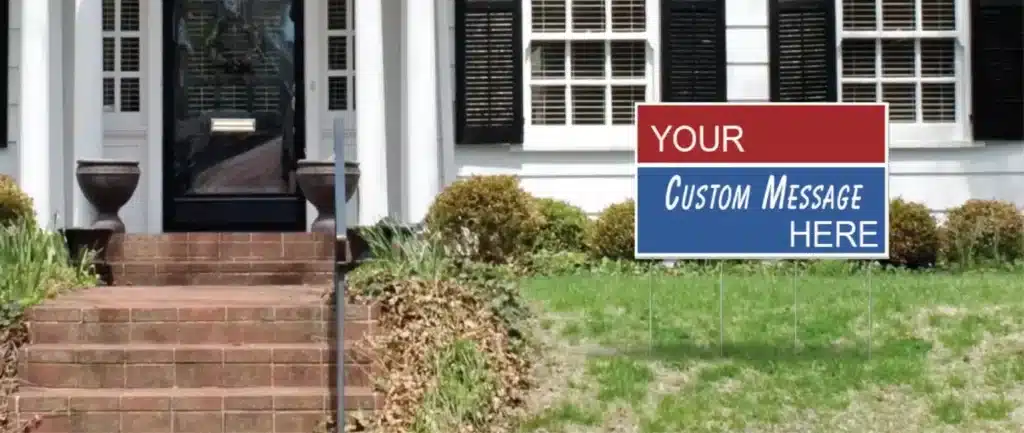Can Churches Display Political Signs?
Questions about churches and political messaging often surface every election season. Can churches put up political signs? Many congregations feel the pressure to take a public stand on social issues, ballot initiatives, or candidates. However, these actions come with specific legal considerations that every faith-based organization must weigh carefully.
Federal tax law, court rulings, and IRS regulations set the boundaries. When a church ignores these restrictions, it risks losing its tax-exempt status and can trigger enforcement actions. At PoliticalLawnSigns.com, we partner with campaigns and organizations nationwide. Therefore, we understand the importance of clarity on this topic.
Can Churches Put Up Political Signs Without Violating the Law?
The tax code defines 501(c)(3) organizations as entities that do not participate in or intervene in any political campaign on behalf of or in opposition to any candidate. This rule comes from the Johnson Amendment, passed in 1954, which Congress later reinforced in 1987 to include statements opposing candidates.
Churches fall under this classification. They cannot endorse, oppose, or donate to candidates for public office. The IRS refers to these actions as “political campaign activity.” This restriction applies to sermons, newsletters, and the display of yard signs that explicitly support or oppose a candidate.
The IRS has issued detailed guidance in Revenue Ruling 2007-41. That ruling explains that churches can speak out on moral or policy issues, but they cross the line when their statements tie directly to candidates. Courts have consistently upheld these restrictions.
In Branch Ministries Inc. v. Rossotti, the court ruled that the government has a compelling interest in preventing tax-deductible donations from funding partisan campaigns. The judges made it clear that free speech rights do not override these tax rules.
Churches that violate this prohibition can lose their tax-exempt status. The IRS can also impose excise taxes on any funds spent on campaign activity. Although enforcement is not common, the penalties can disrupt ministry operations and finances.
Political Advocacy vs. Issue Advocacy
Churches can engage in limited lobbying activities and advocacy on public policy issues. For example, a congregation can support or oppose a ballot measure or referendum. Ballot measures do not involve candidates for office, so the rules differ from candidate endorsements.
This distinction explains why some churches display signs that urge a “yes” or “no” vote on specific amendments or propositions. A recent Springfield Citizen article addressed this question in Missouri. A church displayed signs against Amendment 3 because it related to marijuana legalization, not a candidate. Under IRS regulations, this activity qualifies as issue advocacy and falls outside the scope of the Johnson Amendment’s reach.
However, churches still need to track how much time and money they devote to lobbying. Excessive lobbying can also jeopardize tax-exempt status, although the standards differ from those related to the candidate prohibition.
How Churches Can Communicate Positions Lawfully
A church can preach sermons, distribute educational materials, and host discussions about social issues. It can also prepare materials about legislation or ballot measures if the content does not encourage a vote for or against a specific candidate.
Revenue Ruling 2007-41 highlights examples of activities that do not violate the ban. Churches can sponsor voter registration drives or candidate forums as long as they remain nonpartisan. The key lies in neutrality and equal treatment. If a church only invites specific candidates or selectively highlights one party’s positions, it crosses into prohibited territory.
Any signage that includes explicit statements supporting or opposing a candidate usually triggers scrutiny. For example, if a church installs yard signs that say “Elect Jane Doe for Congress,” it risks IRS penalties. In contrast, a sign that reads “Vote No on Amendment 3” addresses a ballot measure and does not constitute campaign intervention.
Enforcement and Public Scrutiny
Although enforcement happens infrequently, churches still face risk when they disregard the rules. The IRS Tax Exempt and Government Entities Division monitors reports of political activity and investigates credible complaints. Each election cycle, the IRS issues reminders that 501(c)(3) organizations must avoid campaign intervention.
Public scrutiny also plays a role. Campaigns, watchdog groups, and competing organizations often document and report violations. Even if the IRS does not pursue revocation, reputational damage can result. Donors may hesitate to give if they suspect their contributions are used to fund partisan efforts.
When a church wants to advocate for or against legislation, leadership should document spending and time devoted to the effort. Clear records demonstrate compliance if questions arise later.
Practical Guidance for Churches Considering Signs
Before displaying any signage, a church should determine whether the message relates to a candidate or a policy issue. Messages about candidates create the highest risk. Leaders should consult legal counsel or a tax professional if uncertainty arises.
If the message involves a ballot measure or legislative issue, churches have more latitude. However, they still must track lobbying activities. Clear policies, training, and review procedures help prevent unintentional violations.
Churches also need to consider the size, placement, and duration of their signs. Large displays may attract more scrutiny and complaints. More minor yard signs placed on private property with clear policy-oriented messages pose less risk.
At PoliticalLawnSigns.com, we help organizations communicate their message with professionalism. We provide custom signage for ballot initiatives and community outreach that respects these legal guidelines.
If a congregation needs durable corrugated plastic signs or fold-over poly-coated options, we can deliver fast turnaround and straightforward pricing. Contact us to explore solutions that match both your mission and the law.

